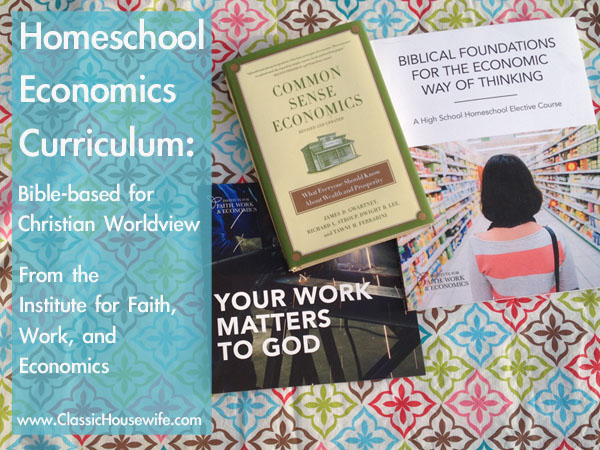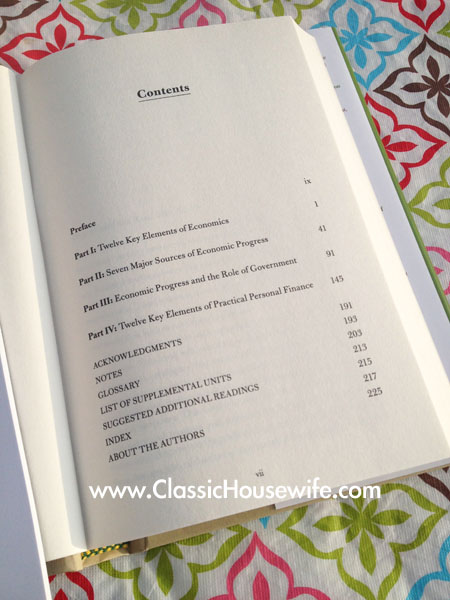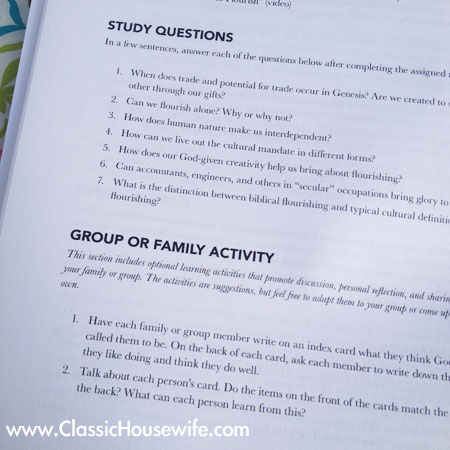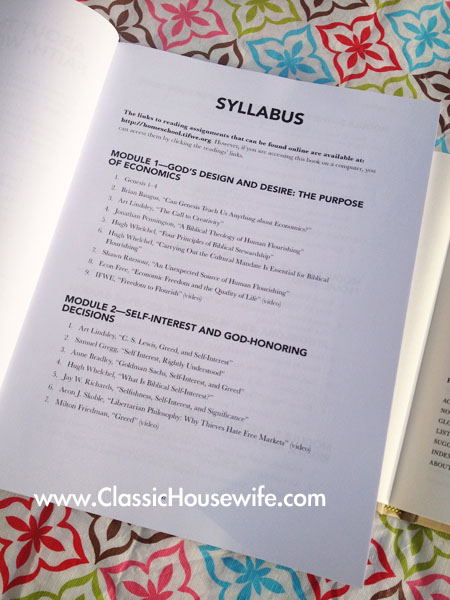*Please read my disclosure at the end.*

I remember very little from my high school Economics class. I do remember a pretty heavy discussion about how it is wrong to buy a dress, leave the tags on, wear it to a party, and return it the next day. We may have talked about credit cards and bank loans. I literally remember nothing else.
Our country is full of the economically illiterate, and yes I think I would have to include myself in that lot. And here we are, homeschooling high school, and Economics is one of those things that we are all required to teach. I admit I have been less than enthusiastic about it.
It’s for that reason that I jumped at the chance to get my hands on a new homeschool economics curriculum from The Institute for Faith, Work, and Economics: Biblical Foundations for the Economic Way Of Thinking.
I mean, this sounds like something that is right up my alley, doesn’t it? And I have to tell you now that it is exactly what I was hoping it would be.

Why Do We Need To Teach Economics?
Besides the fact that it’s required? I’m sure many a parent has asked this question and many a student has wondered why they need to learn this. Perhaps our confusion really begins with the question: “What IS economics?”
My 16 year old asked me that exact question, and I was surprised to discover that I had trouble defining it for her. How would YOU define economics? . . .
How about this:
Economics is the social science that describes the factors that determine the production, distribution and consumption of goods and services. (Wikipedia)
Economics can actually be defined a few different ways: it’s the study of scarcity, the study of how people use resources, or the study of decision-making. (American Economic Association)
Using resources, consuming goods and services, producing goods and services–our kids will be doing these things for the rest of their lives. Shouldn’t our kids have a good understanding of how it all works together so they can make well informed decisions as adults? Yes, they should!
What Do I Need In a Homeschool Economics Curriculum?
“Ok, I’m in, now what do I need to look for in an economics curriculum?”
Excellent question! Obviously, there are many different mindsets and philosophies when it comes to how goods and resources should be used and shared. You’ll probably want a curriculum that closely aligns with what you believe is a fair and accurate interpretation of economics for today. You will also want your kids to come out of the economics course with a better understanding of economics than I did. And you will also want your children to be able to apply that and use it well later in life.
So what we need is an economics curriculum that:
- Is true and fair
- Is thorough and also easy to understand
- Teaches the kids to think critically and apply good economic principles

Biblical Foundations For The Economic Way Of Thinking
Biblical Foundations for the Economic Way of Thinking is a high school homeschool elective course that is exactly what it sounds like: a biblically based course on the principles of economics for a biblical view on economic thinking.
In other words, this course is a “biblical exploration of the basic principles of economics.”
Through the Bible, multiple Bible-based articles, and the main text Common Sense Economics: What Everyone Should Know About Wealth And Prosperity, students will learn to think economically according to God’s design in order to be good stewards, bring God glory, and live faithfully as Christians.
This economics course is from The Institute for Faith, Work, & Economics, whose purpose is to empower Christians to live fully and completely for God’s glory through their work.
Sounds good so far, right, but how does the economics course hold up against our three requirements?
Bible-Based Economics: True and Fair
As a Christian, one of my main goals for my children is that they would learn to use the Bible as a guide in every area of life. Our Bible is our source of truth. Using the Bible as a source of truth allows us to make fair and just decisions in life.
For example, in “Can Genesis Teach Us Anything About Economics” by Brian Baugus, (one of the early readings in the course,) the author provided multiple examples of God’s people trading with foreigners and then posed this question specifically in regard to boycotting, “do we influence people by engaging them or withdrawing from them?” This question sparked a rather lengthy discussion with my sixteen year old, encouraging us to consider both halves of the question fairly and critically.

In-Depth But Understandable Economics
The very topic of economics has you on the edge of your seat, right? No? You’re expecting dry material and complex jargon.
I admit that my right-brain, artsy side cringes a little and struggles through anything that has to do with math, or numbers, politics, or economics. But before we got very far into the preface of Common Sense Economics, I felt a little better.
“Most of you do not want to spend a lot of time learning new terms, memorizing formulas, or mastering details that are important only to professional economists. What you do want are the insights of economics that really matter. . .”
Yes! That IS what I want. Common Sense Economics, the curriculum guide, and the additional readings are all written in a style that my daughter and I can read together–and understand them. However, these aren’t watered down topics. This is thorough 17-week course.

Critical Thinking About Economic Principles
It’s not enough just to read the material and repeat it back well enough to answer questions, right? The Biblical Foundations for the Economic Way of Thinking curriculum is built on a selection of written materials that need to be read, discussed, dissected, and digested. Along with discussion questions and group activities, there are plenty of opportunities to work through the thought processes behind the principles.
My sixteen year old and I have already had good discussions about whether to boycott and why boycotting sometimes works and sometimes fails, the opposing views toward big government and limited government, and our current society’s attitude toward work vs. God’s design for work.

Solid Economic Principles for Biblical Stewardship
Initially I was a little surprised to see economics tied to biblical stewardship but after thinking about it, it makes a lot of sense. I was also surprised to see it tied to fulfilling God’s purpose for our lives and the work that He calls us to. But that makes sense, too.
This is one of the reasons that I’m so happy with this curriculum, because this is exactly what I want for my daughter. I want to give her the tools she need to live out her purpose, fully, wisely, as a good steward of all the resources God has given her–time, talent, money, ideas, and service.
Biblical Foundations for the Economic Way of Thinking is a solid economics curriculum that meets my three requirements and satisfies my desire for curriculum which aligns with my faith.



I have to agree. Everybody should adopt the economic way of thinking…
[…] – Institute for Faith, Work & Economics, spring semester […]